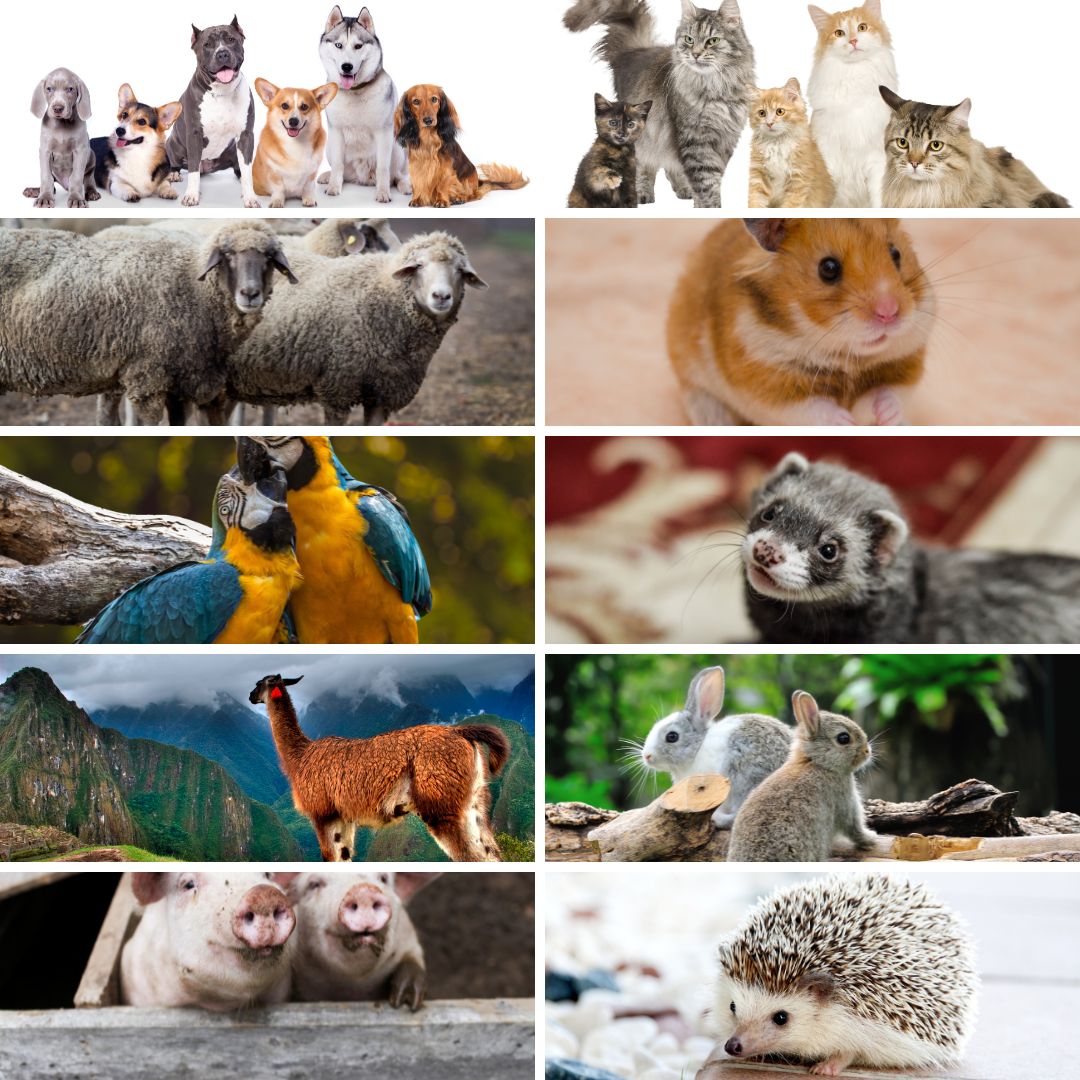10 Best Types of Emotional Support Animals.


10 Best Types of ESAs
1. Dogs – The Most Popular Emotional Support Animal
- Labrador Retriever: Friendly and calm, ideal for individuals with anxiety and depression.
- Golden Retriever: Known for their gentle nature, perfect for people with PTSD.
- Poodle: Hypoallergenic and highly intelligent, suitable for those with allergies.
- Requires daily exercise (30-60 minutes) depending on breed.
- Regular grooming, especially for long-haired breeds.
- Veterinary care for common health issues like hip dysplasia.
- Monthly costs range from $50 – $150 depending on the breed and care needs.
2. Cats – Quiet and Independent Emotional Support Animal
Cats are the second most popular ESA. They are an excellent choice for those seeking a quieter, more independent emotional support animal. Their affectionate yet low-maintenance nature makes them ideal for individuals living in smaller spaces or those who prefer a more relaxed companion.
Popular Breeds for Emotional Support:
- Ragdoll: Extremely affectionate and known for their docile temperament.
- Maine Coon: Friendly and sociable, ideal for families.
- Sphynx: Hypoallergenic and sociable, suitable for people with allergies.
Care Needs:
- Regular grooming, particularly for long-haired breeds.
- Litter box cleaning and maintenance.
- Routine veterinary visits for vaccines and health checks.
Cost of Maintenance:
- Monthly costs average between $30 – $100.
3. Rabbits – Gentle and Affectionate Support Animals
Rabbits make wonderful emotional support animals due to their gentle nature, quiet demeanor, and ability to be litter-trained. They offer comfort and companionship without the need for large living spaces.
Popular Breeds for Emotional Support:
- Holland Lop: Friendly and affectionate, known for their floppy ears.
- Mini Rex: Soft fur and calm personality, great for those seeking gentle companionship.
- Lionhead Rabbit: Playful and unique in appearance.
Care Needs:
- Requires a safe, enclosed space for exercise.
- Daily hay, vegetables, and water.
- Regular grooming.
Cost of Maintenance:
- Monthly costs typically range from $20 – $40.
4. Guinea Pigs – Sociable and Easy-to-Care-For Emotional Support Animals
Guinea pigs are small, friendly animals that make great emotional support companions, especially for those with limited living space. They thrive on social interaction and form close bonds with their owners.
Popular Breeds for Emotional Support:
- American Guinea Pig: Easy to care for and friendly with humans.
- Abyssinian Guinea Pig: Active and curious, with a unique coat.
- Peruvian Guinea Pig: Long-haired and affectionate.
Care Needs:
- Needs a clean, safe habitat with room to move.
- Fresh vegetables, hay, and guinea pig pellets daily.
- Regular handling to maintain sociability.
Cost of Maintenance:
- Monthly expenses typically range from $10 – $30.
5. Birds – Interactive and Intelligent Emotional Support Animals
Birds can offer emotional support through their social, interactive nature. They are intelligent animals capable of forming strong bonds with their owners, and their ability to mimic speech and sounds can be soothing.
Popular Breeds for Emotional Support:
- Budgerigar (Budgie): Small, friendly, and easy to care for.
- Cockatiel: Gentle and affectionate, great for first-time bird owners.
- African Grey Parrot: Highly intelligent and capable of deep emotional bonding.
Care Needs:
- Clean cage, fresh water, and a balanced diet of seeds, fruits, and vegetables.
- Daily interaction and socialization.
- Toys for mental stimulation.
Cost of Maintenance:
- Monthly costs range from $20 – $50 depending on the species.
6. Hamsters – Small and Low-Maintenance Emotional Support Animal
Hamsters are easy to care for and can provide emotional comfort through their cute and playful nature. They are perfect for individuals who want a small, low-maintenance ESA that doesn’t require much space.
Popular Breeds for Emotional Support:
- Syrian Hamster: Solitary and easy to handle.
- Dwarf Hamster: Smaller and social with other hamsters.
- Roborovski Hamster: Known for their quickness and playful nature.
Care Needs:
- Clean the cage weekly with fresh bedding and food.
- Provide toys for stimulation and an exercise wheel.
- Fresh water daily.
Cost of Maintenance:
- Monthly expenses average $10 – $20.
7. Miniature Horses – Unique Emotional Support Animals
Miniature horses are gaining popularity as emotional support animals, particularly for individuals with physical disabilities. Their size and strength, combined with a gentle temperament, make them ideal for emotional and physical support.
Popular Breeds for Emotional Support:
- Falabella: Known for their calm, friendly demeanor.
- American Miniature Horse: Small, sociable, and highly trainable.
Care Needs:
- Requires access to outdoor space for grazing.
- Regular hoof trimming and dental care.
- Routine exercise and social interaction.
Cost of Maintenance:
- Monthly costs range from $150 – $300.
8. Miniature Pigs – Intelligent and Affectionate Emotional Support Animals
Miniature pigs are smart, affectionate, and trainable, making them a unique choice for emotional support. They form strong bonds with their owners and are known for their playful yet calm behavior.
Popular Breeds for Emotional Support:
- Juliana Pig: Small and friendly, easily trained.
- Vietnamese Pot-Bellied Pig: Loyal and affectionate.
Care Needs:
- Balanced diet of grains, fruits, and vegetables.
- Indoor and outdoor space for exercise.
- Regular veterinary care for hooves and weight monitoring.
Cost of Maintenance:
- Monthly costs average $50 – $100.
9. Turtles – Calm and Long-Living Emotional Support Animals
Turtles offer a calm and peaceful presence, making them excellent emotional support animals for individuals seeking quiet companionship. Their long lifespan ensures that they remain with their owners for many years.
Popular Breeds for Emotional Support:
- Red-Eared Slider: Easy to care for and friendly.
- Painted Turtle: Known for its beautiful markings and calm temperament.
Care Needs:
- Requires a clean tank with fresh water and UV lighting.
- Diet includes turtle pellets, vegetables, and insects.
- Regular tank cleaning to maintain health.
Cost of Maintenance:
- Monthly costs typically range from $10 – $30.
10. Alpacas – Unusual but Effective Emotional Support Animals
Alpacas may seem like an unusual choice for an emotional support animal, but their calm and friendly nature makes them a fantastic option for providing comfort. They are fluffy, gentle, and enjoy human interaction.
Popular Breeds for Emotional Support:
- Huacaya Alpaca: Fluffy and friendly, great for petting.
- Suri Alpaca: Known for their silky fleece and calm temperament.
Care Needs:
- Requires outdoor grazing space.
- Regular shearing and grooming.
- Social interaction with other animals or people.
Cost of Maintenance:
- Monthly costs typically range from $100 – $200.
How to Choose the Right Emotional Support Animal for You?
1. Assess Your Emotional Needs
The first step in choosing the right ESA is understanding your specific emotional needs. Do you suffer from anxiety, depression, PTSD, or another mental health condition? Different animals provide different kinds of emotional support:
- Dogs are known for their loyalty and ability to provide physical comfort during anxiety or panic attacks.
- Cats offer quiet companionship and are great for those who prefer a more independent pet.
- Rabbits and guinea pigs are gentle and soothing, perfect for individuals needing a calm, low-maintenance companion.
2. Consider Your Living Situation
Your living environment plays a huge role in selecting the best emotional support animal:
- If you live in a small apartment, cats, guinea pigs, or birds may be better suited than larger animals like miniature horses or dogs that need more space to roam.
- For those with access to outdoor space, a miniature pig or alpaca could be a unique and rewarding choice.
- Consider pet restrictions and landlord policies, especially if you’re renting. Small pets like hamsters or rabbits are usually more accepted than larger animals.
3. Evaluate Care and Maintenance Needs
Some emotional support animals require more time, care, and maintenance than others. Before choosing, think about how much effort you can realistically invest in the care of your ESA:
- Dogs typically require daily exercise, grooming, and social interaction.
- Cats are more independent and need less attention but still require regular feeding and litter box maintenance.
- Rabbits, guinea pigs, and birds need regular cage cleaning and attention but are generally easier to care for than larger animals.
- Animals like miniature horses or alpacas require outdoor space, grooming, and specialized care.
4. Allergies and Health Considerations
5. Personality and Temperament
- Labradors and Golden Retrievers are known for their calm and friendly demeanor, making them ideal for anxiety and depression support.
- Rabbits and guinea pigs are gentle and loving, providing a soothing presence for people needing calmness in their lives.
- Miniature horses and alpacas are calm and patient, perfect for individuals who prefer a larger companion with a steady temperament.
6. Long-Term Commitment
How to Get an Emotional Support Animal?
If you’re considering an Emotional Support Animal to help improve your mental and emotional well-being, the process is simple, but it requires proper documentation to ensure you can enjoy the legal benefits of having an ESA. Here’s how to get started on your journey to acquiring an ESA and how you can easily obtain an ESA letter through Fast ESA Letter.
Step 1: Appointment
Start by creating an account on the Fast ESA Letter portal and schedule an appointment with a licensed mental health professional (LMHP). The key to getting an emotional support animal is obtaining a valid ESA letter from a licensed mental health professional.
Step 2: Consultation
Consult with the LMHP via audio or video call. During this consultation, the mental health professional will assess your emotional needs and determine if an ESA is suitable for your condition. The process is fast and straightforward, ensuring you get the help you need without the hassle of visiting a physical office.
Step 3: Approval
If you’re deemed eligible, the LMHP will approve your request for an ESA letter. The approved letter will be delivered directly to your email. This letter is official and can be used to secure housing accommodations or other rights granted to ESA owners.
Conclusion
Choosing the right type of Emotional Support Animal (ESA) can have a profound impact on your mental and emotional well-being. Whether you prefer the loyalty of a dog, the calm presence of a cat, or the unique companionship of a rabbit or alpaca, there is an ESA suited to your needs and lifestyle. Each animal brings its own benefits, offering comfort, support, and companionship.
Remember, obtaining an official ESA letter from a licensed professional is essential to enjoy the legal protections and benefits that come with having an emotional support animal. By following the simple steps, you can begin your journey toward emotional healing and improved well-being with the perfect ESA by your side.
Frequently Asked Questions (FAQs)
What Other Animals Can Be Emotional Support Companions?
How Do Emotional Support Animals Differ From Service Animals?
What Are The Legal Considerations For Owning an Emotional Support Animal?
Are There Any Requirements For Registering an Emotional Support Animal?
Can Emotional Support Animals Accompany Owners in Public Places?
How Can One Train Their Pet to Become an Emotional Support Animal?
What Are The Benefits of Having an Emotional Support Animal?
Can Children Have Emotional Support Animals?
What Are The Top Small Dog Breeds For Emotional Support?
Which Emotional Support Animals Are Best For Apartment Living?
Are Hypoallergenic Animals Available For Emotional Support?
Post Author
Prince Sharma
Related Articles
Is a Fox Terrier the Right Emotional Support Dog for You?
Is a Fox Terrier the Right Emotional Support Dog for You?Fox Terriers can be your perfect emotional support animal, offering unmatched comfort and companionship if you're dealing with emotional or mental health challenges. To officially make your Fox...
Can Your Tenant Own an Alligator as an Emotional Support Animal?
Can Your Tenant Own an Alligator as an Emotional Support Animal?Yes, an alligator can become an emotional support animal (ESA) if a licensed professional provides an ESA letter. However, due to safety concerns, many landlords and states may restrict...
Why Choose Rabbits as Emotional Support Animals?
Why Choose Rabbits as an Emotional Support Animal?Rabbits make great emotional support animals due to their calm nature, gentle demeanor, and ability to bond closely with their owners. They're easy to care for, require minimal space, and their...
Live Free with Your ESA!
An ESA Letter Unlocks Freedom!




